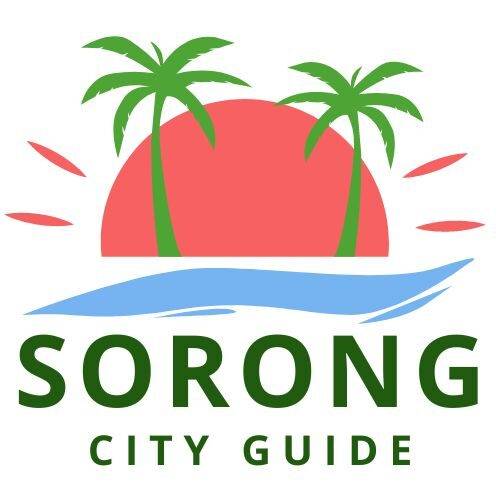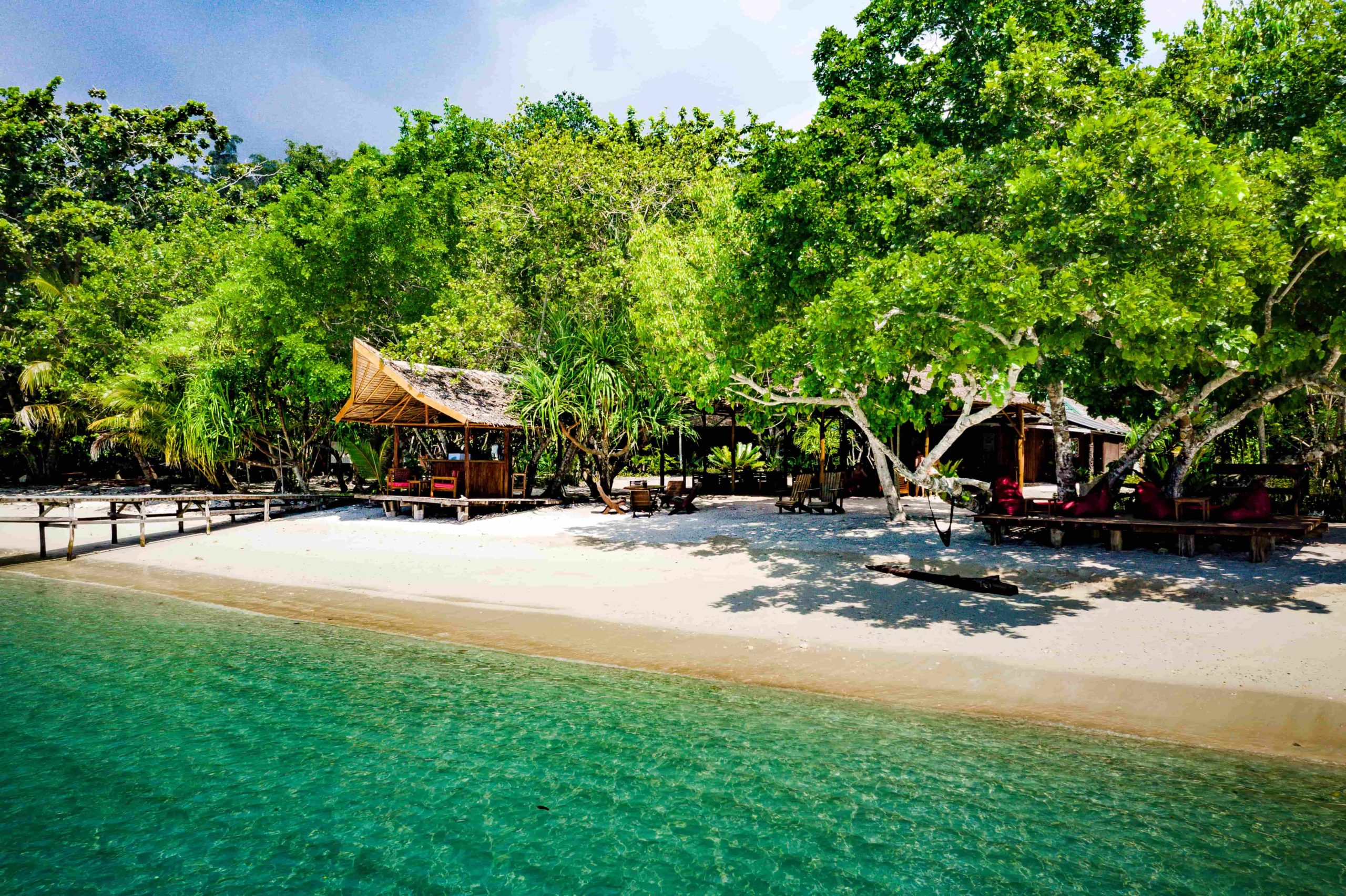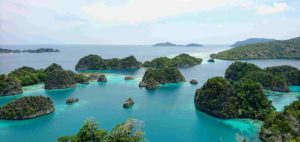“As divers and nature lovers, we wish to create a resort which provides environmentally sustainable accommodation and activities for travellers and tourists, and manages natural resources in the best possible way to enhance the lives of the surrounding community, while maintaining the quality of the natural environment around the island of Gam.” – Mission of Biodiversity Nature Resort Raja Ampat in Indonesia
Ecotourism is tourism that pays special attention to the natural environment and the local population. A limited number of hotels, tourist infrastructure, and environmentally friendly operations minimize negative environmental impacts. Social projects, local employment, and support for local businesses maximize the positive impact of tourism. Certain criteria, regular evaluations and adjustments to current situations guarantee the greatest possible success for companies that want to follow a sustainable path.
We will take a closer look at Ecotourism, its definition, criteria and benefits, and use the example of Biodiversity Nature Resort Raja Ampat to find out how ecotourism can (and should) be optimally implemented in practice.
What are Ecotourism and Sustainable Tourism?
The term ecotourism is a broad term and leaves a lot of room for different definitions.
“Ecotourism” was first used in the 1960s to describe all types of tourism in “protected areas”. In 1990, The International Ecotourism Society (TIES) defined ecotourism as “responsible travel to natural areas that preserve the environment and increases the prosperity of the local population”. A while later, after the International Year of Ecotourism in 2002, the UNWTO (United Nations World Tourism Organization) together with the UNEP (UN Environment Programme) tried to find a new uniform definition.
According to the UNWTO Sustainable Tourism is “tourism that takes full account of its current and future economic, social, and environmental impact, addressing the need of the visitor, the industry, the environment, and the host community”. The ICTR (Responsible Tourism Partnership) says that sustainable tourism „is making better places for people to live in, and better places to visit“.
Whichever definition you prefer, the result is the same: the negative footprint you leave should be as small as possible. As people around the world become more aware of the effects of climate change, the demand for companies in all sectors that operate sustainably increases. When we are travelling, we discover ancient cultures and pristine nature and it is our great desire to preserve them for many more generations.
But how can this be put into practice?
The GSTC Criteria
The Global Sustainable Tourism Council GSTC is an independent and neutral organization that sets and manages global sustainable standards, known as GSTC Criteria. These criteria can be used as guidelines in the tourism industry – for political decision-makers and destination managers, as well as for hotels and tour operators.
They represent the minimum requirements that every company in the tourism sector should meet to protect and conserve the world’s natural and cultural resources while ensuring that tourism benefits and improves the standards of living of the local community. They can be used as a measure of the path to more sustainability and help new companies to establish a sustainable operating pattern that can be implemented in the long term.
The following GSTC Criteria should be met:
- Sustainable Destination Management (through a strategy/concept and by monitoring and evaluating progress)
- Maximizing the benefit for the host community and minimizing negative effects (e.g. by sensitizing and educating visitors, supporting local businesses, or providing local access)
- Maximize benefits for communities, visitors, and culture and minimize negative impacts (e.g. by managing visitor behaviour and protecting cultural heritage)
- Maximizing benefits for the environment and minimizing negative impacts (e.g. through waste, water and energy management, protection of the environment, and minimal pollution)
Find more information here: https://www.gstcouncil.org/gstc-criteria/
In Practice
Sustainable company policy is essential to be able to meet the above criteria. This policy can be divided into two main parts: first, the protection and conservation of nature, and second, the support of the local community. Furthermore, we can distinguish between methods and practices that are implemented in day-to-day operations and various projects that only take place occasionally.
The following practices and projects of Biodiversity Nature Resort Raja Ampat provide a closer look at how a sustainable company policy can be put into practice.

FOR THE LOCAL COMMUNITY
Education
LOCAL EMPLOYMENT. The most obvious thing a company can do for the local community is to focus on hiring local employees. Even without previous work experience or little or no knowledge of the English language, local employees receive the necessary training and knowledge. This opens up life-changing opportunities for them – also for their future after leaving the company.
CONTRIBUTION TO EDUCATION. There are many ways to support local community education. By donating books and teaching materials to local schools, students get the chance to expand their general and specific knowledge. By hiring an English teacher to teach at local schools, a company can help ensure that students receive adequate English training and increase their chances of working in the tourism sector in the future. Scholarships funded by the company offer students who do not have the necessary financial resources themselves the opportunity to continue their education and to have better career opportunities in the future.
Lifestyle
FINANCING INFRASTRUCTURE. A company can help build and maintain infrastructures, buildings, and playgrounds by providing manpower, knowledge, and materials.
DONATION. Regular donations of food (e.g. at Christmas, Ramadhan, or in unpredictable situations like during the Covid-19 pandemic), clothing, and other necessary items support and improve the lifestyle of the local communities.
Businesses
SUPPORT FOR ECOTOURISM SERVICES. Local guides are the best guides to experience authentic jungle tours, village visits, or other wildlife encounters. By organising these tours and paying tour guides directly, the locals have an immediate income for their families.
BUY LOCALLY. By buying as much locally as possible, small family businesses are supported and the local community is encouraged to continue their traditional way of life. Buying organic vegetables, homemade coconut oil, and fresh fish from local fishermen, as well as buying building materials and handicrafts from nearby villages will improve the local economy and thereby the local lifestyle.
Find out everything about the tree of life in The Coconut Part I: The nut that’s not a nut
Health
ORGANIZING AND SPONSORING HEALTH PROJECTS. Doctors and nurses are regularly invited to visit local villages and perform medical exams for adults and children. They also explain the importance of good health, inform the local community about important nutrients and the right choice of food, and provide the villagers with the necessary medicines and care packages.
FOR THE ENVIRONMENT
Construction in harmony with nature
The respectful treatment of nature begins already with the construction of the resort. Natural, locally purchased materials not only adapt well to their natural environment but also support the local economy. By using driftwood or recycled wood, no trees need to be cut down in the jungle. By planting flowers and trees in the garden, butterflies and birds find a place to play and do their little mating dance.
Conservation of resources
Careful handling and the conservation of natural resources are the top priorities of an eco-resort. As one of the most valuable natural resources, particular attention needs to be paid to water consumption. Using bucket-style toilet flushes, regularly maintaining faucets, not changing towels and bed sheets daily, and using natural sunlight for drying laundry are just a few examples. Eco-friendly soap and shampoo are provided in the bungalows to ensure guests use biodegradable products that don´t harm the environment.
Avoid pollution
To save energy and avoid pollution, the resort is powered by solar energy. With several hours of full sunshine each day, a solar panel system is the best solution. Photovoltaic panels and batteries supply the entire resort with environmentally friendly, sustainable electricity – 24 hours every day.
Waste management
One of the biggest problems in most developing countries is the lack of a reliable waste processing facility. It is therefore even more important to pay attention when shopping, avoid plastic packaging, and buy products in bulk sizes. Batteries used in the resort are rechargeable. Waste is either composted or collected separately and then transported to the city for recycling.
Read also 6 great tips to reduce your plastic waste while travelling!
Conservation of the environment
Regular beach clean-ups allow guests to participate in environmental protection. It is important to set a good example, raise awareness of guests, encourage them to implement certain practices at home, and become more environmentally friendly.

Be careful with “Greenwashing”!
So far so good. All over the world, people are becoming more and more aware of the consequences of climate change and are demanding more transparency and a responsible approach to nature from all kinds of businesses. Unfortunately, not everything that sounds “green” really is green, ecological, or sustainable. Many companies, especially in the tourism sector, practice “greenwashing” and use terms like eco, sustainable, and organic as marketing strategies to attract new customers. Be aware! Find out about existing practices and projects before choosing your next vacation spot.
Become an Eco Traveller
In the end, it is up to you to become aware of your responsibility towards nature and the environment. Choose eco-travel and support companies that are committed to preserving nature and improving the lifestyle of local communities. Set a good example, choose your destinations wisely, and encourage friends and family to do the same by supporting the right companies.
Read the guide The Responsible Tourist.
Find more information here: https://www.gstcouncil.org/for-travelers/
Is Sustainable Tourism the solution for Post-COVID-19 Travel?
In our current situation of the pandemic, a lot of people are wondering how it will be possible to travel again in the future.
Many consider sustainable travel as the solution to follow the recommendations given for dealing with the coronavirus, without having to give up their vacation.
There are many reasons to choose companies who follow a sustainable path for your post-COVID-19 travel: being close to nature with clean, fresh air; being able to connect with yourself and nature; being respectful of foreign cultures and traditions and being able to follow social distancing due to the mostly very spacious facilities and bungalows.
These are just a few of the many advantages that you can expect when staying at an eco-resort.
Conclusion
Ecotourism is responsible travel to destinations and companies that operate in harmony with nature and protect the environment while improving the well-being of the local community by employing, training, and supporting them.
The example of Biodiversity Nature Resort Raja Ampat is proof enough that successful business operations and sustainability can go hand in hand. The implementation of certain practices keeps the ecological footprint as small as possible, while the implementation of numerous projects for and with the local community maximizes the positive effects of tourism.
Since we all live together on one planet, it is our responsibility to protect our beautiful nature and to preserve the many unique cultures that live here for many more generations to come. Mahatma Gandhi once said: “Be the change you wish to see in the world.” – so why not start today and choose a lifelong, sustainable lifestyle?
Are you already an eco-traveller? How do you choose your next vacation destination?




